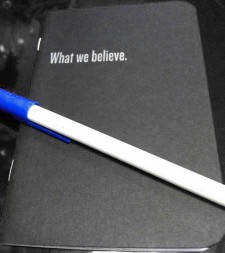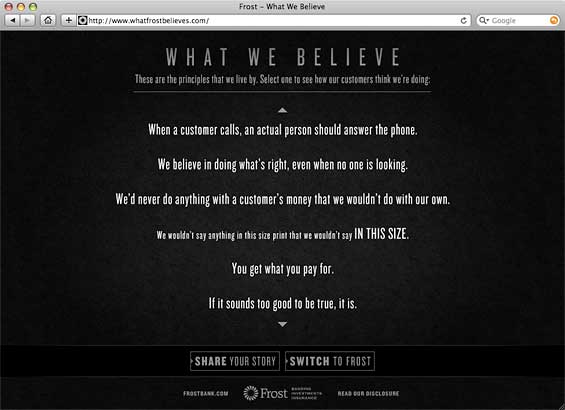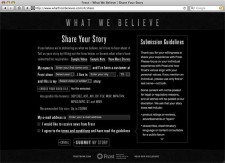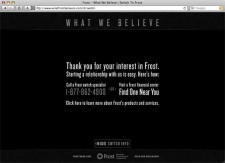Texans subscribing to the Wall Street Journal awoke one morning to find a little black book inserted in between their newspaper and its plastic wrapper. The 12-page booklets, titled “What We Believe,” turned out to be mini-manifestos outlining the tenets of Frost Bank’s customer covenant.
The bank makes a number of short, bold statements, most of them no more than a sentence:
- Bankers should know their customers by name and vice versa.
- Courtesy should not be based upon the size of one’s nest egg.
- The Golden Rule is more valuable than a free toaster.
- When a customer calls, an actual person should answer the phone.
- We believe in doing what’s right, even when no one is looking.
- We’d never do anything with a customer’s money that we wouldn’t do with our own.
- We wouldn’t say anything in this size print that we wouldn’t say IN THIS SIZE.
- You get what you pay for.
- If it sounds too good to be true, it is.
- Slow. And. Steady. Wins. The. Race.
- All the ATMs in the world are no substitute for customer service.
 Readers don’t realize it’s a Frost Bank marketing tool until the last page, where the bank ironically points out that, “We believe there is only so much you can learn from a book.” Readers are then directed to either call Frost’s toll-free number or visit a microsite, WhatFrostBelieves.com.
Readers don’t realize it’s a Frost Bank marketing tool until the last page, where the bank ironically points out that, “We believe there is only so much you can learn from a book.” Readers are then directed to either call Frost’s toll-free number or visit a microsite, WhatFrostBelieves.com.
The microsite is blends raw black-and-white style with Spartan functionality. With unapologetic simplicity, the site lists the bank’s 11 belief statements, describing them as “the principles that we live by.” Each statement is hotlinked to a series of relevant customer testimonials, including a mix of thank-you notes, photos and even videos. A quick scan of the testimonials in each category suggests there are a lot of happy Frost customers, giving the microsite real potential to be both personal and immersive.
Frost National Bank declined to participate in the US government’s TARP capital purchase program, a wise decision from a strategic branding perspective. The bank was also ranked #1 in Texas in terms of customer loyalty and satisfaction by J.D. Power this year, and received the 2010 Customer Engagement Award from Allegiance. Obviously the bank is doing something right.

Instant Messaging. Instant Impact.
Connect with your customers and provide lightning-fast support as effortlessly as texting friends. Two-way SMS text messaging is no longer optional.

The Power of Localized Marketing in Financial Services
Learn how to enhance your brand’s local visibility, generate more leads, and attract more customers, all while adhering to industry regulations and compliance.
Read More about The Power of Localized Marketing in Financial Services

MINI-MANIFESTO MICROSITE
Frost put a small banner ad on its homepage linking to the microsite.
The ad said, “If you like getting an actual person when you call, tell us about it.”


SHARE & SWITCH
The bank invites customers to share their story, and invites non-customers to switch to Frost.
Images: Via Control Freak Publications
What does your organization believe?
Does your bank or credit union have a manifesto? A customer bill of rights? A customer experience promise? Something more profound and pithy than the uncourageous corporate clichés littered in most financial institution’s mission and vision statements?
How would your organization finish these statements:
- “We believe in __________ .”
- “We believe we should __________ .”
- “We believe our customers should __________ .”
- “We don’t believe in __________ .”
- “We will never __________ .”
- “We will always __________ .”
If you’re looking for clues into your organization’s beliefs, you should start with your core values. How would you translate your core values into promises you can make to customers? If you don’t have any core values defined, then this series of questions is a great place to start.
Most banks and credit unions don’t have all the answers. That’s why this is an excellent item to add to the agenda of your next strategic planning session.








